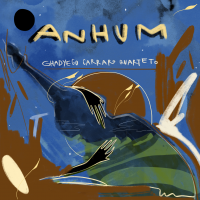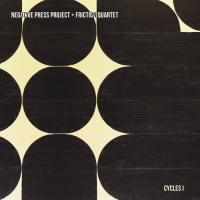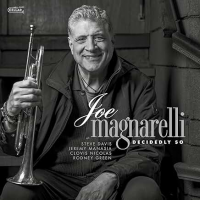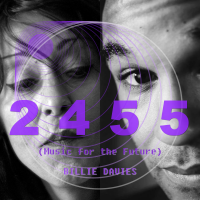Home » Jazz Articles » Extended Analysis » Miles Davis: Seven Steps: The Complete Columbia Recordin...
Miles Davis: Seven Steps: The Complete Columbia Recordings, 1963-1964
From the first Los Angeles sessions in April of '63 through to the live Berlin recording of the nascent quintet in September of '64, not only does the introduction of each member have a significant impact on how the relatively stable repertoire of songs is treated, but it also illustrates how each new member causes existing members to rethink and re-examine the way they approach the song list, starting as a relatively straightforward post bop group and ultimately emerging as truly revolutionary interpreters, as would be highlighted even further on the December '65 performances that would make up the now out-of-print box set, The Complete Live at the Plugged Nickel 1965.
But first some history. By the spring of '63, any semblance of a permanent lineup for Davis was in shambles. Long-gone were saxophonists John Coltrane and Cannonball Adderley, both experiencing their own individual successes, albeit in radically different contexts. Hank Mobley had also departed after recording some memorable but sadly overlooked dates that included those documented on last year's reissue of In Person Friday and Saturday Nights at the Blackhawk, Complete . Also gone were pianist Wynton Kelly, bassist Paul Chambers and drummer Jimmy Cobb, who ultimately forged their own path as both a trio-for-hire and as a group in their own right.
Faced with an April '63 club date in Los Angeles and a couple of days in the recording studio, Davis pieced together a band that consisted of British ex-pat pianist Victor Feldman , drummer Frank Butler, tenor saxophonist George Coleman, and 26-year old bassist Ron Carter . The quintet converged on a Los Angeles studio on April 16 to record what would eventually become the first side of Miles' Seven Steps to Heaven. Disc one of this collection represents the first time that all the tracks from that two-day session have been collected in one place, including three unreleased tracks that serve to illustrate exactly how different this quintet was from the one that would record the second side of Seven Steps to Heaven a mere month later in New York.
"I Fall in Love Too Easily," "Baby Won't You Please Come Home" and "Basin Street Blues," all ended up on the original release. Two other standards, "So Near, So Far" and "Summer Night," would show up on Directions , a '70s compilation, and Quiet Nights , the '63 release whose uneven quality would cause such a rift between Davis and producer Teo Macero that Miles wouldn't step into the studio again for nearly three years. While Feldman and Butler are clearly more straight-ahead players, and Carter consequently plays a more straightforward rhythm section role, there still is a certain space, a certain looseness with the time sense that indicates something new is going on.
But the real revelation of the first disc is the version of Feldman's "Joshua" and the two takes of his tune "Seven Steps to Heaven," which would ultimately go unused, although these compositions would be re-recorded by the New York quintet that would end up represented on side two of Seven Steps to Heaven. On the LA session Feldman proves that, while he is a more than able pianist, his strength as a writer may have been even more significant; he may only have played with Miles on this one session, but the tunes 'Seven Steps to Heaven' and 'Joshua' have become standards that are covered to this day. These earlier versions of the tunes swing along nicely, but they lack the fire that they would have with Williams in the drum chair. On "Seven Steps to Heaven" Butler starts out on brushes before switching to sticks for Coleman's solo, lending a lighter weight that works, but feels somehow less substantial. Feldman's accompaniment is capable but has less personality than Hancock's would. And Carter, whose sense of adventure and daring would grow in leaps and bounds when placed in the fertile context of Hancock and Williams, seems somehow constrained by the others.
Overall, this version of the Miles Davis Quintet serves as an interesting footnote in the gradual emergence of the second quintet, but is most memorable for Feldman's compositional contributions, which would remain in the repertoire for the next year or so, and for the introduction of Carter and, to a lesser extent, Coleman.
The first half of disc two documents the May session that would yield the second side of the Seven Steps to Heaven album. Davis signed 17-year-old wunderkind Williams, fresh from Jackie McLean's group, and the 23-year old Hancock, previously with Donald Byrd's group. Hancock had already begun a successful career of his own a year earlier with the release of Takin' Off , where he demonstrated that he was already forming his own voice as a player and composer.
Re-recording Feldman's two tunes, as well as "So Near, So Far" from the April session, it was clear that this was the rhythm section Davis was looking for. The three pieces that ultimately made their way onto Seven Steps to Heaven , as well as a previously unreleased rehearsal take of the title track, show a group of young and hungry players that, while well-versed in the traditions that came before them, were not interested in being mere torch-bearers. While the level of interplay that would all-too-soon reveal itself between Hancock, Carter and Williams had yet to make a strong showing, these tracks do demonstrate a quintet that feels plainly more contemporary. And Williams' youthful exuberance is felt on every track, regardless of the context. His solos on both takes of "Seven Steps to Heaven" are more immediately inventive and take more liberties than those of Butler's a month earlier.
The second half of disc two and all of disc three are devoted to restoring one of the quintet's early performances, a month after the New York studio session, at the Antibes festival in Juan-les-Pins. The original monaural LP of Miles in Europe consisted of edited versions of "Autumn Leaves," "Joshua" and "All of You," now restored to their full length, as well as "Milestones," "I Thought About You" and ""Walkin.'" Finishing the hundred-and-four minute set is "Bye Bye Blackbird," which segues into "Bye Bye (Theme)," both previously unreleased. With only a month under its belt, the quintet already begin to take broad liberties with the material, demonstrating the more orchestral approach that the group would hone further over the years to follow.
While this band could swing with the best of them, it was already equally disposed to letting the tunes break down in ways that could only happen when a telepathic sense of interplay is involved. "Milestones," for example, was traditionally taken at breakneck speed with little letup. But in the hands of this quintet the tempo drops and picks up, in intuitive ways that few groups of the time could manage. And Hancock's classical upbringing brought a greater degree of impressionism than any pianist previously with Davis, save perhaps Bill Evans, although Hancock's approach already displayed a greater abstraction, something that would continue to evolve as the members of the quintet became even more comfortable with each other. The group's sense of dynamics are impeccable, most notably in the case of Williams, who may have possessed the brashness of youth, but already demonstrated a more mature vision than many drummers twice his age.
While Coleman would eventually become a bone of contention, in particular with Williams, at this point in the quintet's evolution he was a good fit. Yes, he may have treated the rhythm section a bit too traditionally as a rhythm section, whereas Davis was already letting it drive him as much as he directed it, but the disparity that would become more evident later had yet to appear.
Seven months later the quintet, in full swing, arrived at New York's Philharmonic Hall for two sets that would be culled to produce two records: '65's My Funny Valentine , a ballad album, and '66's Four & More , which featured the more up-tempo tunes. But these albums only scratched the surface of the two sets that were performed that night, a fact which Columbia ultimately corrected by releasing the more complete two-CD set, '92's Complete Concert 1964: My Funny Valentine and Four & More , although they still maintained the format of one disc covering the ballads and the other the up-tempo material. This current box completely rights these wrongs by restoring the sets to their original sequence, with disc four being the early show, including a previously unreleased version of "Autumn Leaves," and disc five presenting the second longer set, with a previously unreleased introduction by Billy Taylor.
The two sets demonstrate this version of the quintet at the height of its powers while displaying the disparity that would soon result in Coleman's resigning from the band. His playing is as impeccable as ever on both sets, perhaps too much so. Williams had, in fact, become increasingly dissatisfied with Coleman's slick approach, and the tension nearly broke up the group. What is evident in these two sets, which have long since entered the realm of classic, is that while Hancock, Carter, Williams and Davis have begun to move ever further away from the more traditional treatment of a set list that consisted mainly of well-heeled standards and Davis originals that had been performed since the '50s, Coleman continues to vigorously assert the tradition. All too often it feels that there is a push-and-pull going on, with the rhythm section attempting to push Coleman away from his more straightforward approach, and Coleman digging his heels in and pulling them back. Still, in some ways this tension is what makes the performances so compelling.
And the performances on these two sets clearly deserve the accolades they have received over the ensuing years. By this time the group was so comfortable within itself and so completely in pursuit of assessing the essence of the material in new ways that they became, in a sense, a mini-orchestra where, seemingly at the drop of a hat, they would reshape themselves into a variety of subsets. Piano-and-bass duo would become drums-bass-trumpet trio, which would become trumpet-bass duo before becoming a full quintet once again. The flow of the music seems completely effortless, and the interaction between Hancock, Carter, Williams and Davis reached another in a series of highs.
The second set is arguably filled with more intensity and experimentation, the story has it because Davis informed the group, during the break, that he was waiving his and the group's fees for the concert (much to their chagrin), which was a benefit in support of CORE, SNCC and the NAACP Legal Defense Fund. And while the band could play as tenderly as ever, as it does on "I Thought About You," a certain spark makes this a more satisfying set overall.
With Coleman's resignation, Williams took the initiative to find a replacement. While some of his suggestions, including Archie Shepp and Eric Dolphy, seemed far too left-of-centre, Davis accepted his recommendation of Boston-based Sam Rivers, and the group took off for a brief tour of Japan, resulting in Miles in Tokyo , an album that was originally issued in Japan only, appearing in North America for the first time as disc six of this collection.
While Davis would ultimately find Rivers too avant-garde for his tastes, the group is in fine form on this recording, and Rivers is clearly more attuned to Hancock, Carter and Williams, who continue to push Miles into more open territory. Rivers' style may be a tad too brash, with a raw edge that is a little too hard for the more diverse nuances of Davis' group. Still, the feeling that Coleman was at times holding the group back has completely disappeared, leaving the group able to more freely explore the set, which consists of "If I Were a Bell," "My Funny Valentine," "So What," "Walkin,'" "All of You" and the brief set-closer, "Go-Go (Theme)."
The group shows just how far it's come with its hard-hitting version of "So What," with Williams in especially incendiary form. Carter walks hard throughout the tune, but Williams and Hancock are more exploratory, playing fast and loose with dynamics and abstraction. The intuitive way in which the rhythm section seems to work its way in and out of time and more conventional harmony illustrates just how far it is possible to take these standard tunes when in the hands of a group where chemistry is more than just a catch-phrase, it's completely endemic.
At the end of the day, while Rivers is clearly not the right fit for the group, the tracks from Miles in Tokyo are much more than a failed experiment, and in context of this entire collection serves as just one more step towards the formation of the final lineup.
The final tumbler falls into place on disc seven, representing Miles in Berlin , another record seeing release in North America for the first time, and including a previously unissued version of "Stella By Starlight." The repertoire may have been safe—including "Milestones," "Autumn Leaves," "So What," "Walkin'" and "Go-Go (Theme)"—-but one can hear an almost audible gasp as the group takes full shape with the recruitment of Wayne Shorter, finally available after a five-year stint with Art Blakey and the Jazz Messengers. Shorter is as comfortable bending rhythm, harmony and texture as the rest of the group, and along with Hancock, Carter and Williams, he drives Miles further into outward-reaching territory.
With a firmer footing in the tradition than Rivers, and a more cerebral approach that mirrors Hancock's more intellectual tendencies, Shorter fits in as the perfect complement to Miles' ever more expansive reach. It would be another year before the quintet would release E.S.P. , the first album of new compositions to grace a Miles Davis record since '61's Someday My Prince Will Come. While the group would continue, for the most part, to mine the existing songbook for some time to come, there is no question, by this stage, that something significant was going on. And by the time December '65 and the Plugged Nickel recordings arrived, it would be even more evident that this quintet of young players would take music places it had never been.
Miles may have expressed distaste at the free music of artists like Ornette Coleman, but he clearly had his own conception of freedom, and so did his bandmates, which was one of controlled freedom. Structure would exist as a point of reference, and as a bare roadmap, but other than that caution would be thrown to the wind as the group explored and innovated within these loose frameworks.
As is the case with all of the Miles reissue series, Seven Steps: The Complete Columbia Recordings of Miles Davis 1963-1964 has been painstakingly remastered. Some shows are better than others—the monaural Miles in Berlin has, most likely, been made to sound as good as possible given what is on the original tapes, but it doesn't have the crystalline clarity of the '64 New York Philharmonic recordings. But that is a minor quibble. Across the seven discs, even where the recording quality is less-than even, the performances sparkle. And the listener finally has the opportunity to put these years in perspective and follow the emergence of a group that, while not properly acclaimed during its existence, has gone on to be considered the most inventive band of Miles Davis' long career.
Track Listing
CD1: Joshua; I Fall in Love Too Easily; Baby Won't You Please Come Home; So Near, So Far; Basin Street Blues; Seven Steps to Heaven (take 3); Seven Steps to Heaven (take 5); Summer Night. CD2: Seven Steps to Heaven (rehearsal take); Seven Steps to Heaven; So Near, So Far; Joshua; Introduction by Andre Francis; Autumn Leaves; Milestones; I Thought About You. CD3: Joshua; All of You; Walkin'; Bye Bye Blackbird; Bye Bye (Theme). CD4: Introduction by Mort Fega; Autumn Leaves; So What; Stella By Starlight; Walkin'; All of You; Go-Go (Theme and Announcement).CD5: Introduction by Billy Taylor; All Blues; My Funny Valentine; Joshua; I Thought About You; Four; Seven Steps to Heaven; There is No Greater Love; Go-Go (Theme and Re-Introduction). CD6: Introduction by Teruo Osono; If I Were a Bell; My Funny Valentine; So What; Walkin'; All of You; Go-Go (Theme). CD7: Milestones; Autumn Leaves; So What; Stella By Starlight; Walkin; Go-Go (Theme).
Personnel
Miles Davis
trumpetRon Carter
bassGeorge Coleman
saxophone, tenorVictor Feldman
multi-instrumentalistFrank Butler
drumsHerbie Hancock
pianoTony Williams
drumsSam Rivers
saxophone, tenorWayne Shorter
saxophoneAlbum information
Title: Seven Steps: The Complete Columbia Recordings, 1963-1964 | Year Released: 2004 | Record Label: Legacy Recordings
Tags
PREVIOUS / NEXT
Support All About Jazz
 All About Jazz has been a pillar of jazz since 1995, championing it as an art form and, more importantly, supporting the musicians who make it. Our enduring commitment has made "AAJ" one of the most culturally important websites of its kind, read by hundreds of thousands of fans, musicians and industry figures every month.
All About Jazz has been a pillar of jazz since 1995, championing it as an art form and, more importantly, supporting the musicians who make it. Our enduring commitment has made "AAJ" one of the most culturally important websites of its kind, read by hundreds of thousands of fans, musicians and industry figures every month.































